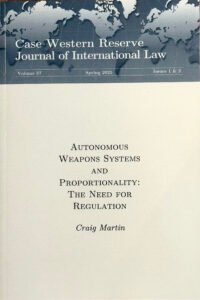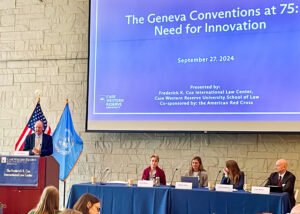 It was a pleasure to discuss in a podcast with Ayesha Malik of Dawn News in Pakistan a range of climate change issues, and in particular the ways in which contributions to climate change, and particular responses to climate change, may contribute to the risks of armed conflict.
It was a pleasure to discuss in a podcast with Ayesha Malik of Dawn News in Pakistan a range of climate change issues, and in particular the ways in which contributions to climate change, and particular responses to climate change, may contribute to the risks of armed conflict.
armed conflict
Autonomous Weapons Systems and Proportionality – New Article
 Published a new law review article, “Autonomous Weapons Systems and Proportionality: The Need for Regulation,” in the Case Western Reserve Journal of International Law, Vol. 57:1 (2025). The full text is available for download at SSRN here, and the abstract is below:
Published a new law review article, “Autonomous Weapons Systems and Proportionality: The Need for Regulation,” in the Case Western Reserve Journal of International Law, Vol. 57:1 (2025). The full text is available for download at SSRN here, and the abstract is below:
This article examines the question of whether International Humanitarian Law (IHL) requires modification to effectively govern autonomous weapons systems (AWS). While extensive scholarly discourse has focused on whether AWS can comply with existing IHL principles, and whether the development and deployment of AWS should be constrained through weapons treaties, insufficient attention has been paid to why and how IHL itself might need adaptation to regulate AWS as a method of warfare. Given that the imminent development and deployment is unlikely to be prohibited, and that AWS may not comply with IHL in certain circumstances, the question of why and how IHL needs to be adjusted is important. The analysis focuses on the principle of proportionality as a means of exploring and illustrating the issue.
The article first traces the evolution of AWS governance debates, highlighting the impasse at the Convention on Certain Conventional Weapons (CCW) regarding constraints on AWS development. It then conducts a detailed examination of the distinct elements and operation of the principle of proportionality, a principle whose implementation demands complex, contextual, and sophisticated judgment.
The article examines the evidence of certain weaknesses of AI-operated AWS, explains why the operationalization of the principle of proportionality would present challenges for such systems, and argues that AWS would likely struggle to implement the principle reliably and predictably in certain operational contexts. The final section supports and defends proposals for the certain adjustments or modifications of IHL to better regulate AWS, thereby ensuring AWS operations remain constrained by the core principles of IHL. It ends by briefly exploring the mechanisms that might be available for developing such constraints.
Discussing Autonomous Weapons Systems and IHL at Case Western Law
 Case Western University School of Law’s annual international law symposium this year focused on the question of whether the Geneva Conventions, enjoying their 75th Anniversary, need to be updated to deal with new challenges, including the application of IHL to space, expanding transnational conflicts with non-state actors, cyber-war, and the development and deployment of fully autonomous weapons systems. The conference began with a closed experts group meeting to discuss the development of a white paper on the issues, followed by an open conference with panels on each of the major topics.
Case Western University School of Law’s annual international law symposium this year focused on the question of whether the Geneva Conventions, enjoying their 75th Anniversary, need to be updated to deal with new challenges, including the application of IHL to space, expanding transnational conflicts with non-state actors, cyber-war, and the development and deployment of fully autonomous weapons systems. The conference began with a closed experts group meeting to discuss the development of a white paper on the issues, followed by an open conference with panels on each of the major topics.
My panel, with Laurie Blank of Emory Univ. Law, Milena Sterio of Cleveland Univ. Law, and Romina Morello of the ICRC, fielded questions from Paul Williams of American Univ. Law, on whether, and how, the Geneva Conventions might need to be updated in some form to better regulate the use of autonomous weapons systems. My article on the subject will be published next year in the Case Western Journal of International Law. Great conference.
Canada’s ‘Royal Prerogative’ Allows it to Wage War Without Parliamentary Approval
(Published in The Conversation, Oct. 24, 2022).
 Questions are being raised again about how the Canadian government makes decisions to use force or participate in armed conflicts, prompted by reports that special forces units of the Canadian Armed Forces were operating on the ground in Ukraine.
Questions are being raised again about how the Canadian government makes decisions to use force or participate in armed conflicts, prompted by reports that special forces units of the Canadian Armed Forces were operating on the ground in Ukraine.
While ostensibly deployed strictly for “training purposes,” such involvement can lead to more direct engagement in an armed conflict.
The decision to engage in armed conflict is one of the most consequential decisions a government can make. Who is involved in the decision-making, and what conditions or principles govern that process? Even more importantly, how should these decisions be made?
As a recent report suggests, the Ukrainian deployment has rekindled interest in these questions on Parliament Hill. But there should be a broader public discussion and debate.
Most Canadians would be surprised to learn that the prime minister and the cabinet have a far more unfettered power under the so-called royal prerogative to take the country to war than most other western democracies.
Early limits on war-waging powers
The modern idea that the power of the executive branch to wage war should be limited can be traced back at least as far as the Glorious Revolution in 1688, when English parliament placed constraints on the king’s ability to raise and maintain an army.
